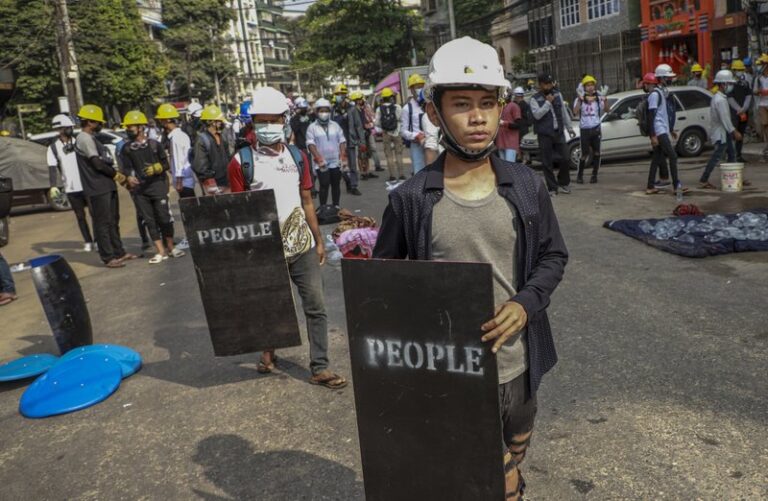
(AP)—Demonstrators in Myanmar protesting last month’s military coup returned to the streets Thursday, undaunted by the killing of at least 38 people the previous day by security forces.
New protests were held in at least three areas of Yangon, the country’s largest city, that have been scenes of violence for the past few days. Police again used force to try to disperse the crowds, according to social media accounts.
Protests also continued In Mandalay, the second-biggest city. A formation of five fighter planes flew over the city on Thursday morning in what appeared to be a threatening show of force.
The U.N. special envoy for Myanmar, Christine Schraner Burgener, said 38 people were killed Wednesday, a figure consistent with other reports.
The death toll was the highest since the Feb. 1 takeover, when the military ousted the elected government of leader Aung San Suu Kyi. More than 50 civilians, mostly peaceful protesters, are confirmed to have been killed by police and soldiers since then.
The U.N. Security Council has scheduled closed-door consultations on Friday on calls to reverse the coup — including from U.N. Secretary-General Antonio Guterres — and stop the escalating military crackdown.
Any kind of coordinated action at the United Nations will be difficult since two permanent members of the Security Council, China and Russia, are likely to veto it. Some countries have already imposed or are considering their own sanctions.
U.N. envoy Schraner Burgener said she warned Myanmar’s army that the world’s nations and the Security Council “might take huge strong measures.”
“And the answer was, ‘We are used to sanctions and we survived those sanctions in the past,’” she said. When she also warned the army that Myanmar would become isolated, she said, “the answer was, ‘We have to learn to walk with only a few friends.’”
The coup reversed years of slow progress toward democracy in Myanmar, which for five decades had languished under strict military rule that led to international isolation and sanctions. As the generals loosened their grip, culminating in Suu Kyi’s rise to power after 2015 elections, the international community responded by lifting most sanctions and pouring investing into the country.
Schraner Burgener said the army has been taken aback by the strong opposition, which has been led by young people.
“I think that the army is very surprised that it doesn’t work because in the past, in 1988 and 2007 and 2008, it worked,” she said, referring to previous violent crackdowns on uprisings against military rule.






